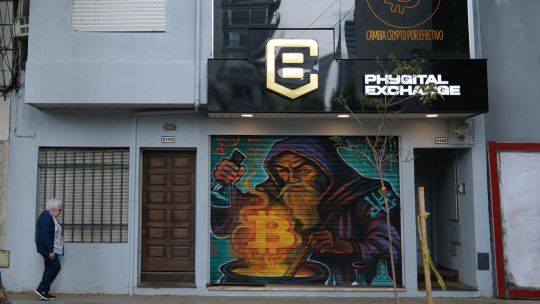
As President Javier Milei tightens currency controls to prop up the peso ahead of midterm elections, Argentines like Ruben López are turning to cryptocurrencies to protect their savings.
A new strategy involves using stablecoins — digital tokens pegged one-to-one with the US currency — to take advantage of Argentina’s official exchange rate, which currently values the peso about seven percent higher than the parallel market rate. The trade goes like this: buy dollars and immediately trade them in for stablecoins. Then, swap those tokens for cheaper market-rate pesos. The arbitrage play, also known as a “rulo,” can yield a quick profit of as much as four percent on each transaction, crypto brokers say.
“I make this trade every day,” said López, a stock broker based in Buenos Aires who uses crypto to “protect myself from inflation.”
The crypto manoeuvre reflects a shift in how Argentines are coping with another round of economic turmoil. The country has been draining its dollar reserves to boost the peso and prevent a breach of its trading band ahead of the October 26 vote, after which investors expect the currency to fall further, even with substantial US support.
When Argentina’s Central Bank recently barred people from reselling dollars for 90 days – part of an effort to curb quick-profit trades – the “rulo” emerged almost instantly. Trading platform Ripio said on October 9 that it had seen a 40 percent weekly surge in stablecoin-to-peso sales “as users take advantage of price variations and market opportunities.”
Some residents see a need to take such measures; after all, they live in a country that has defaulted on its debt three times this century. Milei was elected in 2023 on a platform to end those financial woes. He’s had some success, like bringing annual inflation down to about 30 percent from nearly 300 percent, but the currency has lost around three-quarters of its value due to Milei’s own devaluation when he took office, and, more recently, to investors’ fears about the upcoming elections.
The rulo shows how crypto has evolved from a curiosity that enthused Argentines – including Milei himself – to a financial tool that residents use to protect their savings. Crypto may often be vehicle for speculation in the US, but in Latin America, it’s become a stability play. In nations like Argentina, Venezuela and Bolivia, the technology can be a detour around currency swings, high inflation and strict capital controls.
“We give users the possibility of buying crypto with pesos or dollars and sell them for a return – it’s our everyday business,” said Manuel Beaudroit, CEO of Belo, a local crypto exchange. “That can obviously allow a generous profit due to the exchange rate difference.” In recent weeks, Beaudroit said, traders could make three percent to four percent per trade, but he cautioned that “this is highly unusual.”
Other exchanges are seeing similar patterns. Lemon Cash, another local platform, said total crypto operations – from sales and purchases to swaps – jumped 50 percent above average on October 1, when the Central Bank’s 90-day ban took effect.
“Stablecoins are undoubtedly a vehicle to get cheaper dollars,” said Julián Colombo, Argentina country manager at Bitso, another trading platform. “Crypto is still in the process of being regulated, so the government doesn’t yet know how to control it or restrict liquidity in stablecoins, which has allowed this rulo to flourish.”
But the rise in stablecoin transactions isn’t just about arbitrage. With Milei’s government facing a pivotal election and the economy once again under strain, many Argentines are also using crypto to hedge against a possible peso devaluation.
“Inflation and political uncertainty make us more conservative, so I don’t have any savings or investments in pesos, I only use them for expenses,” said Nicole Connor, leader of Argentina’s Women in Crypto organisation. “I keep my savings in crypto and stablecoins and try to generate returns with them.”
Still, the crypto game isn’t risk-free. While trading on the stock market is tax-exempt, profits from crypto transactions are hit with a levy up to 15 percent. Frequent trades can also draw scrutiny from banks, which often demand proof of funds for users making repeated large transfers.
But as the economic struggles continue, analysts say Argentina’s reliance on digital dollars could deepen as people across Latin America try to shield their assets from fiscal and electoral tremors.
“Stablecoins are here to stay,” said López, the stock broker. “The dollar occupies a very strong place in Argentine society and in everyday life because it has given us a refuge from the national currency.”
by Maria Clara Cobo, Bloomberg





